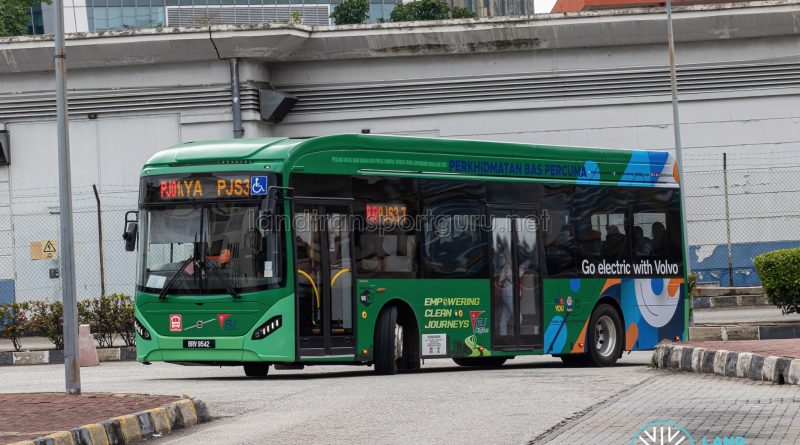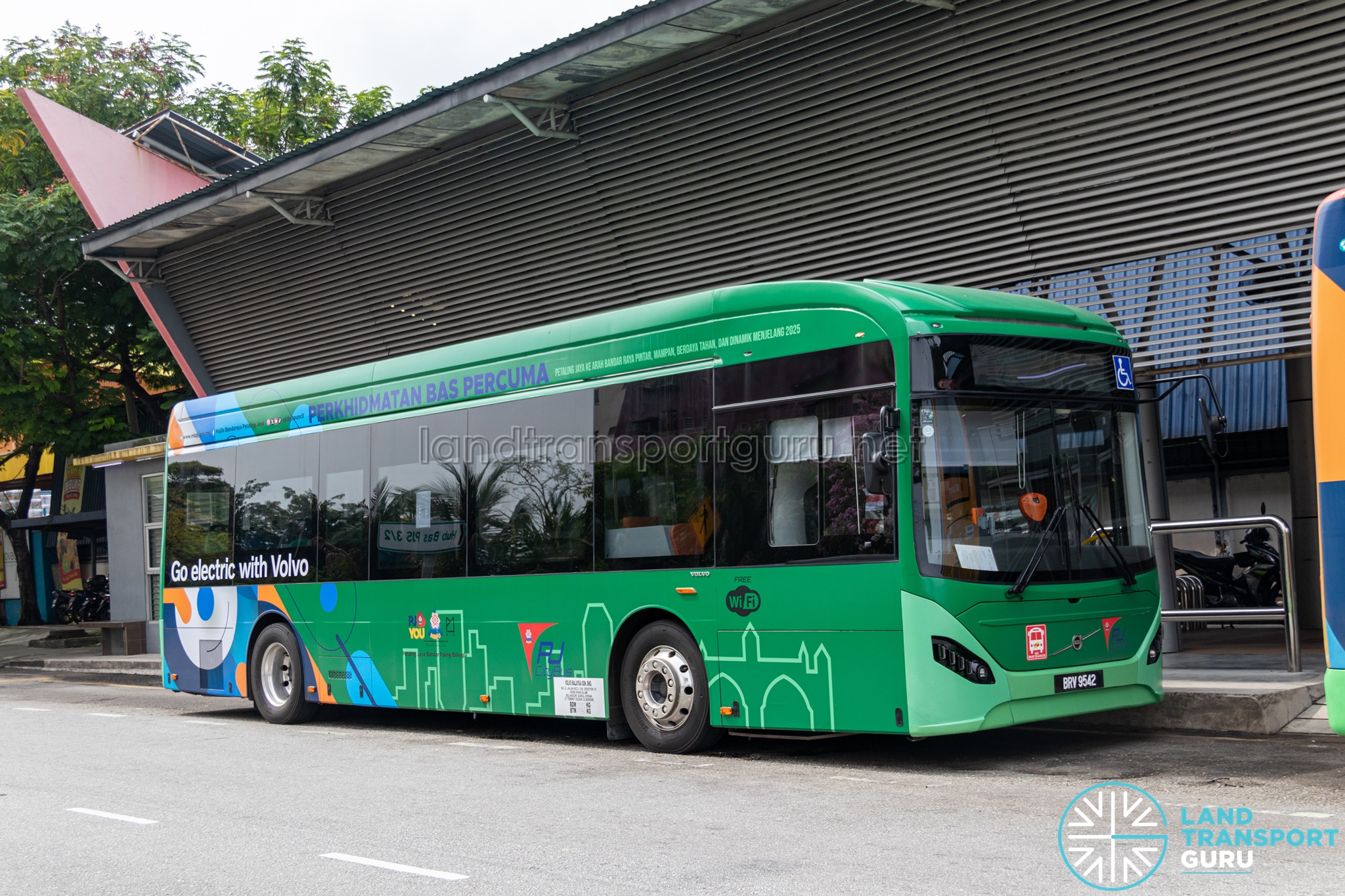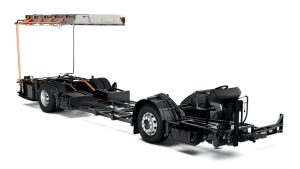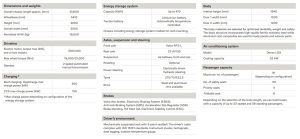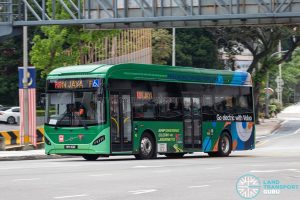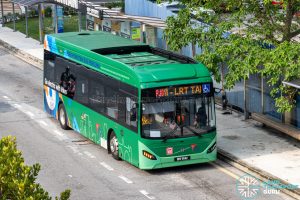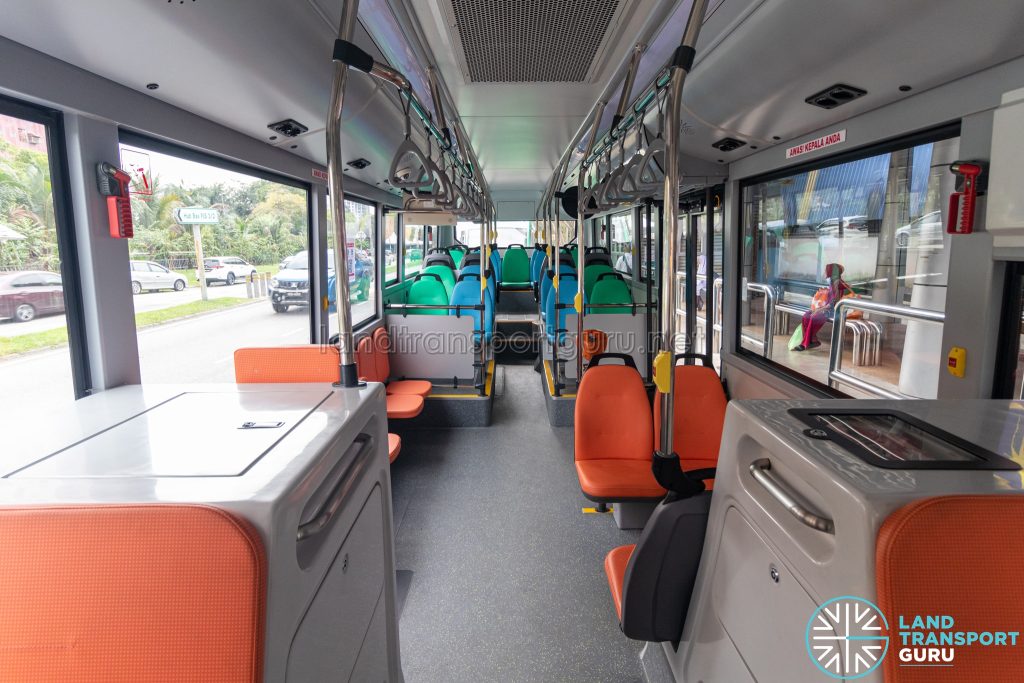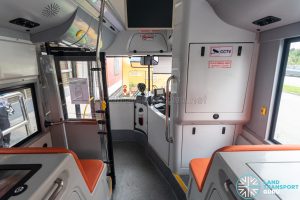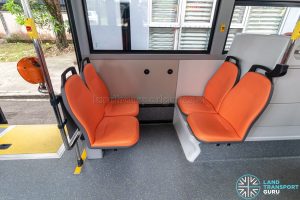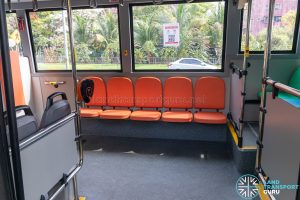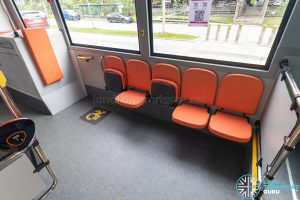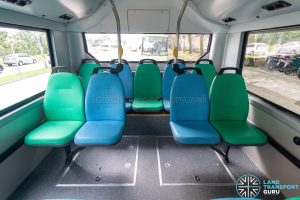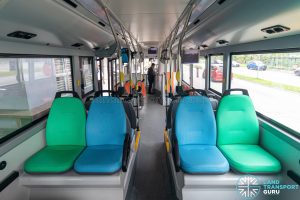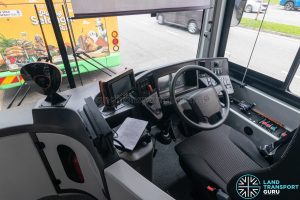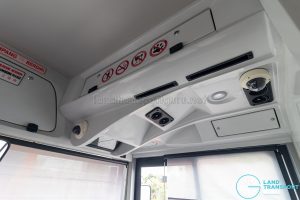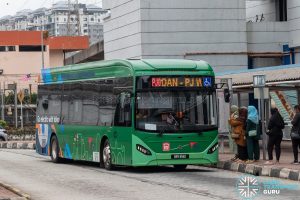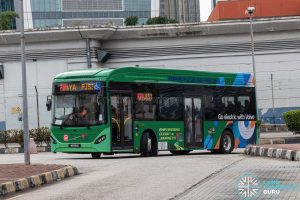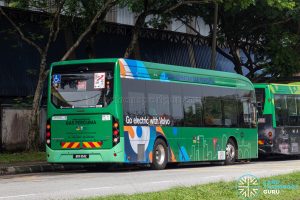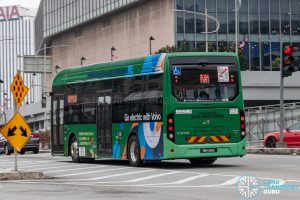The Volvo BZL–GML Eco Range is an electric low-floor city bus jointly developed by Gemilang and Volvo Buses. The bus is built on the Volvo BZL chassis and assembled in Malaysia by local coachbuilder Gemilang.
The bus was first unveiled on 27 May 2024 and was offered to Rapid Bus Sdn Bhd for revenue service trials in the Klang Valley region. Passenger service commenced in mid-August 2024, with the bus deployed to PJ City Bus PJ01, a free bus service with the Petaling Jaya region.
Volvo BZL–GML Eco Range
Jointly developed by Volvo Buses and Gemilang International, the Volvo BZL–GML Eco Range combines Volvo’s European expertise in electromobility with Gemilang’s local bus manufacturing experience. The bus is touted as a premium, emission-free transport solution with advanced safety, efficiency, and energy storage features, which aims to significantly advance Malaysia’s electric bus segment.
The bus supports Malaysia’s public transport transformation by aligning with the country’s plan to increase electric bus adoption, starting in major cities like Klang Valley. This initiative is part of a broader effort to decarbonize the public transport sector by 2030 and achieve carbon neutrality by 2050. The electric bus is expected to reduce carbon emissions by up to 60% when compared to an equivalent diesel bus.
Built on the Volvo BZL 4×2 chassis, the bus is designed for efficient city operations with a flat, low-floor design for accessibility. It offers modular construction to meet various customers’ needs and is cost-effective with reduced repair and downtime.
The bus body can be customised for lengths ranging from 10.6 to 12.5 meters. At maximum capacity, Volvo touts a capacity of up to 91 passengers, with 33 seats (comprising regular, priority, and foldable seats) and 58 standees.
Chassis Background
The Volvo BZL Electric chassis was launched in September 2021. The low-floor chassis can be configured for single-deck or double-deck buses, and the drive motor is paired with a two-stage automated manual transmission, which optimizes energy use and reduces wear. The bus uses Lithium NCA traction batteries, and supports both OppCharge opportunity charging and plug-in CCS depot charging.
Rapid Bus Trial
Rapid Bus Sdn Bhd and Volvo Buses Malaysia also signed a memorandum of understanding (MoU) to trial the Volvo BZL-GML Eco Range electric city bus in the Klang Valley. The trial, initially announced to begin in July 2024, will involve loaning a bus to Rapid KL for up to a year to assess its suitability on local roads.
This initiative aligns with the Malaysian government’s directive to phase out diesel buses and supports the New Energy Transition Roadmap. Prasarana Malaysia, which owns and operates stage buses in the Klang Valley region via its subsidiary Rapid Bus Sdn Bhd, said that it would no longer procure diesel buses after 2025 and aims to phase out diesel buses by 2037.
During the MoU signing, it was announced that the bus would be deployed on Route 581 (Desa Tasik – LRT Bandar Tasik Selatan).
Passenger service
The trial bus, with the chassis number YV3U1W125NA209836, is registered BRV9542. Before passenger service, it bore the trade plate B4092A.
Revenue service trials commenced on August 2024 with the bus deployed on PJ City Bus PJ01, a free bus service with the Petaling Jaya region.
According to the short-term operating license document, the bus is authorized to operate on Route PJ01 (Hentian Taman Medan – LRT Taman Jaya) and Route 590 (Bandar Sg. Long – Hab Lebuh Pudu).
Bus tracking is available via Cityrails.info (filter by Volvo BZL): https://cityrails.info/track/rapidkl/
Technical Specifications
For the driveline, the Volvo BZL can be configured with either one or two motors, with a maximum power/torque of 200kW/425 Nm or 400kW/850Nm respectively. Motors are mated to a two-speed automated gearbox. The exact specifications for the demo unit are not known.
The energy storage system specifications of the demo unit are also not specified. The Volvo BZL GML uses roof-mounted lithium nickel cobalt aluminium oxide (NCA) traction batteries of 94 kWh each and between 3-5 modules, hence offering up to 470 kWh of battery capacity. Buses can be charged via CCS at up to 150kW, or via OppCharge at up to 300kW via roof-mounted charging rails, but this is not used on the demo unit.
For the bodywork, Gemilang Coachwork bodies the buses using its Eco Range aluminium bus body structure. Aluminium and composites are used for body panels and exterior parts. Passenger windows also use double-glazed glass panels that help reduce noise and radiant heat transfer.
Interior
The bus features a full-low-floor interior, with no passenger steps between entrance/exit doors.
This bus has a capacity for up to 60 passengers: 27 seated and 32 standing. This seating capacity excludes five foldable seats located opposite the exit door.
Seats used are Century seats supplied by Vogel Industries, upholstered in blue and green, with priority seats in orange; a typical colour scheme for RapidKL buses. Front wheel arch seats are formed of padded cushions secured directly to body panels.
The area opposite the exit door is configured with five foldable seats and a wheelchair bay. Passengers-in-wheelchair board and alight via a manual wheelchair ramp installed at the exit door.
Towards the rear of the bus, 21 permanent seats are provided.
Wall-mounted USB A and C charging ports are provided near seats, rated at QC 3.0/PD.
Driver’s Cab
Gallery
See Also:
References:
- Volvo BZL – GML Eco Range | Volvo Buses
- Volvo BZL – GML Eco Range Brochure | Volvo Buses [PDF]
- Powering the future, the all-new fully-electric Volvo BZL-GML Eco Range Premium City Bus makes official debut in Malaysia (volvobuses.com)
- Volvo, Gemilang Launch Electric City Bus In Malaysia (gml.com.my)
- Rapid Bus and Volvo ink deal for electric bus test run | The Star
- Rapid and Volvo to jointly conduct electric bus trial (thesun.my)
